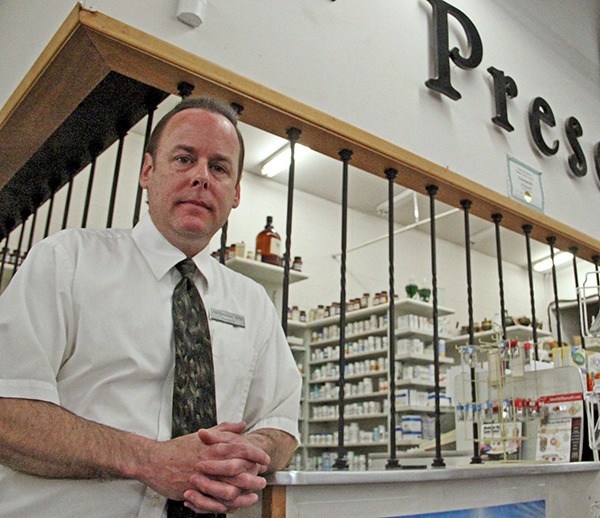The sun sets next Thursday on Peckenpaugh Drug, Auburn’s lone independent pharmacy.
For more than 90 years, Auburn residents have filled their prescriptions at the Auburn institution, which in its time has occupied various locations on Main Street.
But new Food and Drug Agency regulations and rising pharmaceutical industry prices have taken their toll, said James Strachan, Peckenpaugh Drug pharmacist and owner.
“It’s become impossible to make a profit,” Strachan said.
“The cost of (drugs) has drastically gone up, and we haven’t made money on them in four or five years,” Strachan said. “What has happened is since the (Affordable Health Care Act), the drug companies have increased prices on everything. They know the insurance companies are going to have to pay for them regardless, so they (drug wholesalers) have raised their prices.”
Strachan continued:
“Everything in here has at least doubled or tripled,” he said. “It may be cheaper if you have insurance, but if you don’t, it definitely hasn’t gotten cheaper. I think what happened is they expected insurance companies would make a deal with the drug companies and control prices, but the drug companies have turned around and spiked everything up like crazy.”
At the core of the pricing problem is the Maximum Allowable Cost (MAC) established by the federal government. The MAC is the highest price a pharmacist can charge insurance companies or consumers for filling prescriptions.
Now, Strachan said, the actual cost of the drug is often higher than what he is allowed to charge.
“At the beginning of 2013, I started calculating how much we were losing,” Strachan said.
Initially, the losses were small.
“But beginning January of this year, we were losing about $500 (daily) in prescription drugs,” he said. “We weren’t even getting our costs back. We’re not in that mode where we’re getting a lot of return on our investment. We got one product, cost us $995, and we got reimbursed. It took six weeks to get reimbursed, and we got back $986. That happens a lot, more often than you realize. The profit is gone; it’s just not there anymore. The other day we lost $139 on suppositories. We didn’t even get back our cost.”
Strachan estimates that Peckenpaugh is losing more than 10 percent on every prescription it fills. And with the pharmacy as the main moneymaking component of the store – unlike the ones at grocery stores, which are primarily loss leaders to draw customers in – it’s become impossible to show a profit, he said.
And with seven employees’ wages, $5,000 monthly in rent and insurance and other bills to pay, it’s become impossible to cover overhead or make money.
“We’re constantly battling, and on some medication we actually lose money,” Strachan said. “That doesn’t keep us in business. We’re doing good numbers, we’ve got lots of customers still coming in, we’re just not making a profit on them.”
Additionally, Strachan said, new FDA guidelines on the quantity of drugs that a pharmacy can keep on hand have hampered the store’s ability to make money.
“As of January, our wholesaler has limited how much drugs we can purchase from them on certain drugs,” Strachan said.
Peckenpaugh, he said, has restricted ordering ability for several federally-controlled substances – including potentially addicting painkillers such as oxycodone, hydrocodone, fetanyl patches and morphine, as well as Alprozalam (Xanax).
“So now they’ve said we can only have (a certain percentage) of these drugs based on our purchases through that wholesaler,” Strachan said. “Now we end up running out of the drugs in our second week of the month.”
The result is that many customers have to go elsewhere to get their meds.
“Eventually what happens is they keep coming in, and we don’t have, so they just get it somewhere else and stop checking and transfer all their prescriptions out of here,” he said.
For Strachan, who started out as a stock boy at Peckenpaugh during the late 1970s and early 1980s when he was at Auburn High School, and his father who owned Peckenpaugh, the loss is personal.
“It’s not only a blow to the pharmacy, it’s a blow to the town,” he said. “We’re the last of the Mohicans here in town.”
The pharmacy operations at Peckenpaugh’s cease on April 24, with the inventory and customers’ files heading to Safeway.
“They come in and buy the files with the prescriptions, and they get transferred over there,” he said. “And they buy the drugs. That’s all that they’re interested in. We could have sold to any of them, Rite Aid, Walgreens, but Safeway just worked out best for us.”
The store is to remain open for a few weeks after the pharmacy closes to liquidate the remaining stock and fixtures at a discount.
“We’re going to sell everything we can,” he said.
For Strachan’s employees, the closure means early retirement for some, a job search for others.
“Everybody’s a little upset, some of them have been working here a pretty long time,” Strachan said. “The pharmacist and the tech, we’re trying to get them on at Safeway to help ease the transition for the customers.”
Strachan, who signed a non-compete clause with Safeway, barring him from working as a pharmacist within five miles of the store for five years, said he’ll look for work in one of Auburn’s surrounding communities.
“I basically have to work for them or out of town,” he said.
“It’s sad,” Strachan added, looking around the pharmacy cage. “These things are dropping out of site. The industry has just put a pinch on us.”



